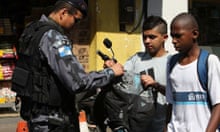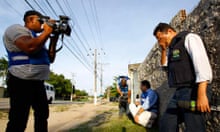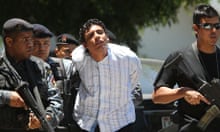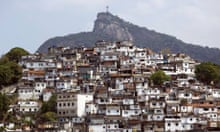More than 3,000 troops launched a pre-dawn assault on Brazil's largest shantytown , driving heavily-armed gang members from Rio's Rocinha favela as part of an continuing effort to clean up the 2016 Olympic city.
At around 4.06am on Sunday, armoured personnel carriers clattered into the gigantic hillside slum. Bulletproof, sniper-laden helicopters soared over the sea of redbrick homes searching for gunmen.
Residents had hung banners asking for peace from their balconies and windows but special forces met no resistance as they piled into the slum's alleys past shuttered shops, stray dogs and heaps of rubbish.
At around 7am police chief Alberto Pinheiro Neto announced that his forces had taken control of the labyrinthine slum, reputedly home to between 70,000 and 200,000 Brazilians, and two other nearby communities.
By lunchtime Huey helicopters continued to circle above the favela, as hundreds of troops moved from alley to alley in search of drugs, weapons and suspects.
The head of Rio's civil police, Martha Rocha, called on Rocinha's female residents to help with the operation, part of a government bid to "pacify" the city before the 2014 World Cup and 2016 Olympics.
"I would like to address all of the mothers, grandmothers, aunts, daughters and sisters," said Rocha, the first woman to occupy her position. "Please make sure to tell us where the drugs, the weapons and the traffickers are."
The Guardian accompanied members of Brazil's federal police drug squad as they raided the home of Sandro Luiz de Paula Amorim, who is said to be a senior drug boss from Rio's Friends of the Friends (ADA) faction, better known by his nickname Peixe or Fish.
Inside Fish's front room rifle-toting officers found a copy of Sun Tzu's The Art of War military treatise, a minibar stocked with miniature bottles of Tanqueray gin and a giant, blue-lit aquarium filled with exotic fish. A tiny sign inside the aquarium read: "Don't bang on the glass!" "It smells like fish in here," said one of the officers as he and a team of sniffer dogs toured the alleged gangster's three-storey mansion at the heart of Rocinha.
Upstairs, on the second-floor, police came to Fish's swimming pool, fitted with a reclining roof for sunny days. Eight sausages and four slabs of beef were defrosting by a poolside barbecue.
Next door, in the bedroom, the agents found a tiled jacuzzi and a baby's cot. One officer dumped his AK-47 on Fish's duvet: black and white and emblazoned with cartoon hearts and the words: "Je t'aime", "Ich liebe dich", "I love you."
In a bedside minibar, there was a half-empty bottle of spicy Hellman's Ketchup. On the bathroom sink sat a bottle of Listerine mouthwash and a flask of Paco Rabanne XS perfume.
Fish, said to have once been the boss of Rio's São Carlos favela – itself "pacified" earlier this year – was one of several alleged drug bosses arrested last week as he attempted to flee Rocinha, escorted by a group of corrupt police officers.
A few streets away, past Renata's bright pink Hair Salon, another group of officers located the most recent hideout of Rocinha's alleged former boss and drug baron, Antônio Francisco Bonfim Lopes, a 35-year-old known as Nem.
Until recently Rio's most wanted man, Lopes was caught on Wednesday night as he allegedly attempted to sneak past a police roadblock curled up in the boot of a Toyota Corolla.
Piling through the three-storey building's metal front door, civil police agents found the sister of Nem's girlfriend, Danubia de Souza Rangel, a 25-year-old blonde better known as Rocinha's first lady because of her romantic ties to the area's alleged former boss.
"I haven't seen her in a week," the woman, who gave her name as Telma, told the officers as they searched the house for drugs and weapons. "I can't tell you anything about Nem," she said. "I can only tell you about myself."
The police found only garish orange sofas, booze – Black Label whisky, Pravda vodka – and, in a drawer underneath a 60-ins flatscreen TV, a book by the Catholic priest turned pop star Marcelo Rossi and a copy of Psalm 23: "The Lord is my shepherd, I shall not want. He makes me lie down in green pastures; he leads me beside still waters."
After more than three decades living under the rule of notoriously violent if sometimes benevolent drug lords, residents reacted nervously to the crack-of-dawn occupation.
"Thank God, it's calm," said one 30-year-old motorbike salesman as he watched three armoured personnel carriers pump diesel fumes into the dawn air outside his flat in the slum.
"We don't know what the reaction will be. It's something new. We live here and we go to work. Nobody ever messed with us before, we always had our freedom," added the man, who declined to give his name." Would that change now? "Let's pray," he said.
Community leader William de Oliveira, a former head of Rocinha's residents' association, said: "We want peace for the residents. Respect. Those who have problems with the law should hand themselves in, pay for their crimes and try to reintegrate themselves into society."
Coffee to cocaine
Often described as the biggest slum in Latin America, Rocinha was established in the 1930s when landless rural workers began occupying the area, once a coffee plantation.
The favela's population grew during the 1950s with an influx of economic migrants fleeing poverty in Brazil's north-east.
To this day, many of Rocinha's estimated 70,000-200,000 residents have roots in the north-eastern states of Paraiba, Pernambuco and Maranhao.
Like all of Rio's 1,000 or so favelas, Rocinha has suffered from decades of neglect. In the state's absence, gang leaders moved in. During the 1980s, drug traffickers seized control of the community, enforcing their rules with an iron fist. One particularly notorious leader, Bem-Ti-Vi, was known for running the area with a militia armed with gold-plated weapons. He was shot dead by police in 2005. Wedged between two of Rio's most affluent neighbourhoods, Rocinha is considered the city's leading cocaine distribution point. The favela also has a vibrant internal economy and is popular with tourists.




